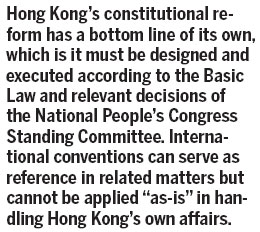Be mindful of the bottom line
Updated: 2013-06-06 07:32
By Xiao Ping(HK Edition)
|
|||||||
There is an old saying in China that nothing can be accomplished without norms or standards. The growing momentum of radicalism in Hong Kong in recent years has led to frequent acts of disturbing public order and directly challenging the rule of law, all of which crossed the bottom line drawn up in the "One Country, Two Systems" principle and the Basic Law. This tendency may have dangerous consequences. That is why people across the social spectrum are deeply worried.
Everything has a bottom line. For example, the central government has stressed that the Chief Executive must "love the country as well as Hong Kong". That is a political bottom line. Some people complain there is no clear standard for "love the country as well as Hong Kong". That's because they haven't read the political work report delivered by Hu Jintao, then outgoing general secretary of the Communist Party of China (CPC), to the 18th National Congress of the CPC last year. The report contains two lines that clearly define "love the country as well as Hong Kong". One is "protect the country's sovereignty, security and development interests", and the other: "protect Hong Kong's long-term prosperity and stability". Those who act against these two requirements cannot possibly "love the country as well as Hong Kong".

Hong Kong's constitutional reform has a bottom line of its own, which is it must be designed and executed according to the Basic Law and relevant decisions of the National People's Congress Standing Committee (NPCSC). International conventions can serve as reference in related matters but cannot be applied "as-is" in handling Hong Kong's own affairs. People have the right to present their own plans for constitutional reform but they must not deviate from the path marked by the Basic Law and relevant decisions of the NPCSC. There is no room for individualism or wild imagination in this case.
One cannot achieve what he wants by crossing the bottom line. In politics and law, crossing the bottom line always ends up in a zero-sum or lose-lose situation, which tends to lead to provocation and confrontation. It must be avoided at all costs. The most typical cases of crossing the bottom line in Hong Kong these days have to be "Occupy Central" and advocating "Hong Kong independence".
"Occupy Central" advocates have openly announced their intention to break the law and willingness to paralyze Hong Kong's financial center in order to make the central authorities and SAR government accept their own format of Chief Executive election by universal suffrage. Their "crossing the line" without considering the consequences has been condemned by people from all walks of life. If the illegal campaign does happen and hurt the economy and society, those responsible for its organization will no doubt be justly punished by law.
As for "Hong Kong independence", it is no more than political provocation by a small group of people. It is pointless to discuss the bottom line with them. They will only fail spectacularly if they do not change their mind and give up before it's too late.
Hong Kong has enjoyed remarkable autonomy since the handover thanks to the "One Country, Two Systems" principle and the Basic Law, both of which also mark out political and statutory borders. The "One Country, two Systems" principle and the Basic Law constitute the ultimate bottom line for Hong Kong that we must never forget.
The author is a senior current affairs commentator.
(HK Edition 06/06/2013 page1)